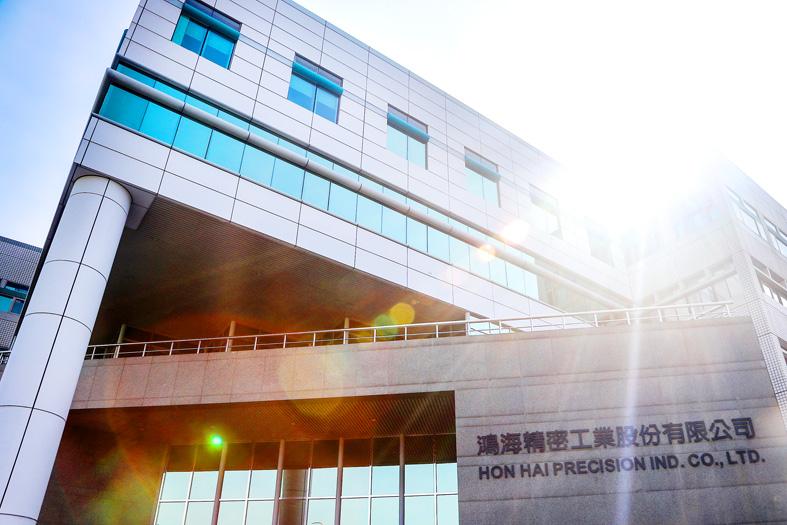Two Chinese production sites of iPhone assembler Hon Hai Precision Industry Co (鴻海精密) and smaller rival Wistron Corp (緯創) have been named “global lighthouse” factories by the World Economic Forum (WEF).
Hon Hai, known outside of Taiwan as Foxconn Technology Group (富士康科技集團), said that its factory in Chengdu had been chosen by the WEF among 15 factories worldwide on this year’s “global lighthouse” list.
The Chengdu plant is the second Hon Hai factory to be included on the list after its Shenzhen plant was chosen in 2019.

Photo: CNA
The WEF and consulting firm McKinsey & Co in 2018 began the list of “lighthouse” factories chosen for their digital transformation — plants that have adopted the latest technologies, such as artificial intelligence (AI) and the Internet of Things (IoT).
Since then, only 69 factories have been included on the list.
Hon Hai said that the choice of the Chengdu plant reflected the company’s efforts to boost the factory’s efficiency by 200 percent by adopting mixed reality, AI and IoT technologies at a time when the company was experiencing a rapid growth in its business, but faced a lack of skilled workers.
Mixed reality is the merging of “real” and “virtual” worlds to produce new environments and visualizations.
Hon Hai has been transforming itself from a pure contract manufacturer into a company that is able to integrate its hardware and software capabilities.
The company has been engaging with emerging technologies, such as 5G applications, electric vehicles and digital healthcare, to boost its profit margin in a competitive global market.
Wistron said that its factory in Kunshan that produces AI plus IoT devices had been chosen.
The factory’s inclusion on the WEF list represents a milestone for the firm, Wistron said, as it has been using new technologies to upgrade its facilities and lay a foundation for corporate sustainability.

In Italy’s storied gold-making hubs, jewelers are reworking their designs to trim gold content as they race to blunt the effect of record prices and appeal to shoppers watching their budgets. Gold prices hit a record high on Thursday, surging near US$5,600 an ounce, more than double a year ago as geopolitical concerns and jitters over trade pushed investors toward the safe-haven asset. The rally is putting undue pressure on small artisans as they face mounting demands from customers, including international brands, to produce cheaper items, from signature pieces to wedding rings, according to interviews with four independent jewelers in Italy’s main

Japanese Prime Minister Sanae Takaichi has talked up the benefits of a weaker yen in a campaign speech, adopting a tone at odds with her finance ministry, which has refused to rule out any options to counter excessive foreign exchange volatility. Takaichi later softened her stance, saying she did not have a preference for the yen’s direction. “People say the weak yen is bad right now, but for export industries, it’s a major opportunity,” Takaichi said on Saturday at a rally for Liberal Democratic Party candidate Daishiro Yamagiwa in Kanagawa Prefecture ahead of a snap election on Sunday. “Whether it’s selling food or

CONCERNS: Tech companies investing in AI businesses that purchase their products have raised questions among investors that they are artificially propping up demand Nvidia Corp chief executive officer Jensen Huang (黃仁勳) on Saturday said that the company would be participating in OpenAI’s latest funding round, describing it as potentially “the largest investment we’ve ever made.” “We will invest a great deal of money,” Huang told reporters while visiting Taipei. “I believe in OpenAI. The work that they do is incredible. They’re one of the most consequential companies of our time.” Huang did not say exactly how much Nvidia might contribute, but described the investment as “huge.” “Let Sam announce how much he’s going to raise — it’s for him to decide,” Huang said, referring to OpenAI

The global server market is expected to grow 12.8 percent annually this year, with artificial intelligence (AI) servers projected to account for 16.5 percent, driven by continued investment in AI infrastructure by major cloud service providers (CSPs), market researcher TrendForce Corp (集邦科技) said yesterday. Global AI server shipments this year are expected to increase 28 percent year-on-year to more than 2.7 million units, driven by sustained demand from CSPs and government sovereign cloud projects, TrendForce analyst Frank Kung (龔明德) told the Taipei Times. Demand for GPU-based AI servers, including Nvidia Corp’s GB and Vera Rubin rack systems, is expected to remain high,